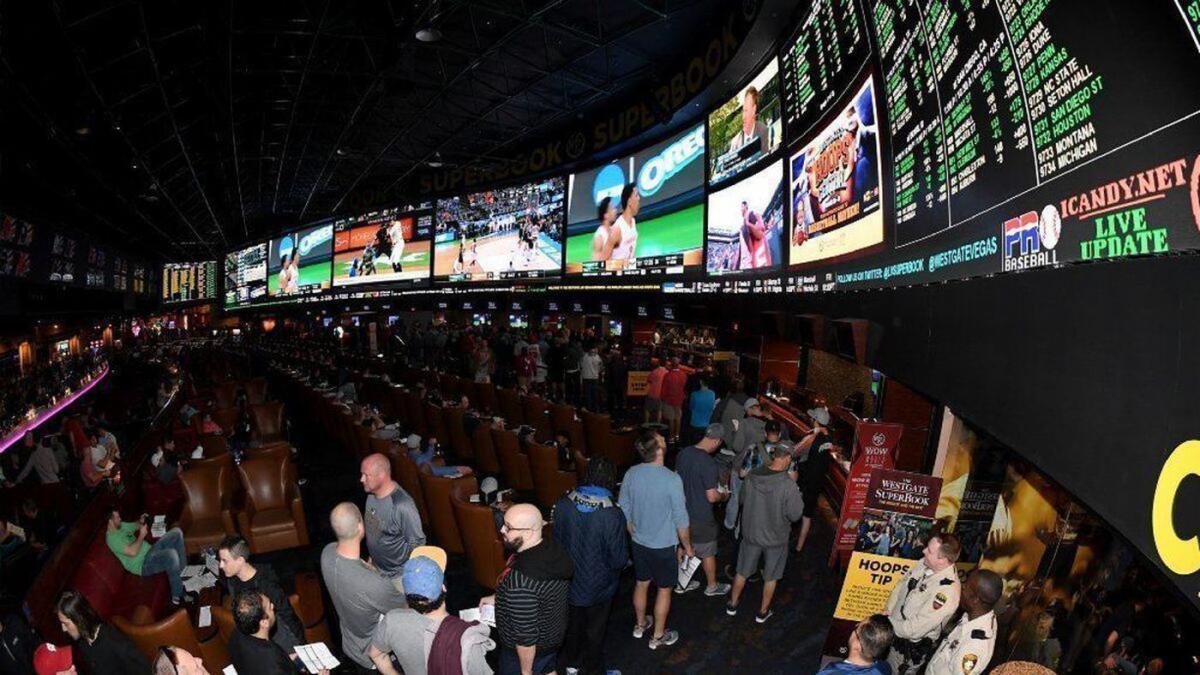Make California sports betting legal? Lawmakers propose measure to go on 2020 ballot

Reporting from Sacramento — Joining a national wave, California lawmakers on Thursday proposed a ballot measure that would legalize sports betting in the state in response to last year’s Supreme Court ruling allowing states to permit wagering.
California voters would be given a chance to change the state Constitution as soon as the November 2020 ballot under a bill introduced Thursday by state Sen. Bill Dodd (D-Napa) and Assemblyman Adam Gray (D-Merced).
Previous attempts to expand gambling in California, including multiple bills to legalize internet poker, have bogged down in the Legislature amid disputes between card clubs and Native American tribes that operate casinos.
The tribal groups, which are influential in the Legislature, have previously opposed new gambling enterprises they believe infringe on their exclusive gaming compacts with the state. Dodd acknowledged that work needs to be done to gain consensus.
“I look forward to working with stakeholders in a collaborative effort to help bring this out of the shadows,” Dodd said. “By legalizing sports wagering, we can avoid some of the problems associated with an underground market, such as fraud and tax evasion, while investing in problem gambling education.”
The proposal drew a chilly response from the California Nations Indian Gaming Assn., which represents many tribal casinos.
Lawmakers “should proceed with caution,” said Steve Stallings, chairman of the association.
“In short, CNIGA does not support any expansion of gaming in California, including sports betting, until the for-profit, commercial card rooms stop their illegal practices, including constitutionally prohibited banked games,” Stallings said. “A legitimate discussion on sports betting could then proceed as long as tribal exclusivity is maintained.”
The Pechanga Band of Luiseño Indians, which operates a casino, also will scrutinize the proposal. “This is an important and consequential policy issue that we have to get right for Californians, tribes and stakeholders. Pechanga looks forward to engaging in the debate to determine the best path forward,” Pechanga Tribal Chairman Mark Macarro said.
Legislation would have to garner a two-thirds vote in the Legislature to get on the ballot, where it could be approved by a majority vote.
The bill introduced Thursday lacks details of how and where sports betting would be allowed and what cut of the money would be taken by the state.
Dodd said his intent is that revenue generated for state coffers from legalization could support public education, infrastructure and other government services.
Gray, who first proposed an initiative a year ago, estimated that illegal sports wagering in the United States amounts to about $150 billion a year.
Eight other states have legalized sports betting and 35 states have been considering the move since the May 2018 decision by the U.S. Supreme Court that struck down a federal law prohibiting sports betting in all states outside Nevada.
Legalization in California would be a boon to the industry, said Jennifer Roberts, associate director of the International Center for Gaming Regulation at the University of Nevada, Las Vegas.
“California would be a premium market for sports betting given its population and sports teams’ presence,” Roberts said.
Roberts said she wouldn’t be surprised if voters approved the initiative, but lawmakers would first have to address several issues. These include “how state-sanctioned sports wagering would impact tribal compacts, which agency would regulate, which businesses could qualify to offer sports wagering, etc.,” she said. “I don’t see these issues being easily resolved.”
A leader of the state’s coalition of card clubs responded positively to the proposal.
“We look forward to working collaboratively with them as we learn more about the proposed constitutional amendment to legalize sports betting,” said Kyle Kirkland, president of the California Gaming Assn., in a statement.
Public hearings on the issue will be held in the coming months by the Senate and Assembly governmental organization committees, which are chaired by Dodd and Gray, respectively.
“Whether we like it or not, Californians are already betting on sports through illegal and often unscrupulous websites in foreign countries,” Gray said.
Previous proposals by others would have allowed sports betting by licensed card rooms, licensed horse racing associations and federally recognized Indian tribes.
Last year, a political consultant proposed an initiative to allow sports betting, but it did not advance beyond the talking stage after some groups voiced opposition.
“This proposed measure would bring Vegas-style gaming to nearly 100 locations and urban areas throughout California,” said Macarro, the Pechanga tribal chairman, about that proposal. “This is not in keeping with California’s long-standing policy of limited gaming, and we will vigorously oppose this measure.”
The NBA, Major League Baseball and golf’s PGA Tour have hired lobbyists in recent months on the issue. Representatives did not respond to requests for comment on the new proposal. But they said in the past they are advocating for safeguards for sports leagues and fans if a new sports betting system is allowed.
The sports leagues have hired high-powered lobbyist Greg Campbell, who was chief of staff for former Assembly Speakers John Perez and Toni Atkins, who is now the leader of the Senate.
The National Football League, which has four teams in California, declined to comment Friday, but the league said in a letter to Congress in December that that it supported federal legislation that would “ensure a legal, regulated, sports betting framework with substantial safeguards for consumers” while also providing for strong enforcement and protecting “league content and intellectual property.”
Sign up for our Essential Politics newsletter »
Twitter: @mcgreevy99
More to Read
Get the L.A. Times Politics newsletter
Deeply reported insights into legislation, politics and policy from Sacramento, Washington and beyond. In your inbox three times per week.
You may occasionally receive promotional content from the Los Angeles Times.











